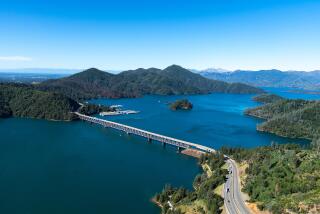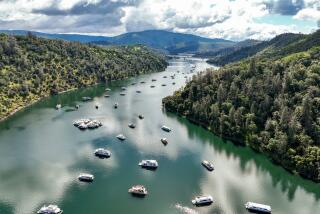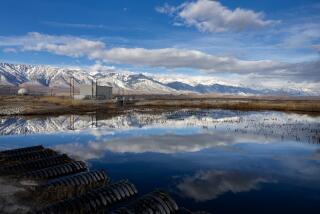Yes, California’s drought is all but over, and the dramatically revived Cachuma Lake proves it

Even though Cachuma Lake is less than half full, its revival has been cause of major celebration.
Reporting from CACHUMA LAKE, CALIF. — Heading into February, things were looking grim here in the rugged hills north of Santa Barbara.
While much of California was emerging from five years of drought, this giant reservoir had dwindled to a weedy channel at just 7% of capacity and was perilously close to being written off as a regional water supply.
For the record:
6:02 a.m. July 1, 2019An earlier version of this article stated that California is emerging from its worst drought in history. Experts generally agree that although the most recent drought was severe, it likely was not the worst to affect the state.
And then the rains came in unrelenting horizontal sheets. It was one of the largest storms in memory over the Santa Ynez Valley on Feb. 17, swamping historical records and causing the lake to rise a whopping 31 feet in depth in just a few days.
It “slammed us with intense sideways rain,” recalled Beverly Keller, manager of the Cachuma Lake General Store. “Falling on the roof of my mobile home, it sounded like thunder that wouldn’t stop.”
Cachuma Lake, once a poster child of the drought, has begun to shed that reputation, and the rhythms of life behind its 64-year-old dam are showing signs of dramatic improvement.
At a nearby marina managed by Keller’s husband, Monty, some rental boats were taking in so much rainwater that they were in danger of sinking.
“We started bailing rainwater out of those boats with water pumps,” said Keller, 52, shaking his head at the memory. “Meanwhile, the level of the lake was rising before our eyes.”
The storm had dropped more than 7 inches of rain over the region, with much of that precipitation cascading down into the lake from the steep slopes and ravines of surrounding mountains. Many of the dusty hilltops that had emerged as Cachuma dropped to historic lows were once again submerged beneath the placid surface of the lake, which had reached 43% of its capacity.
California as a whole also hit a major milestone last week when federal authorities declared that less than 20% of the state faces any drought conditions and no area faces “extreme” or “exceptional” drought.
Some officials blamed the lake’s stubbornly low level on what they called “rain shadow” in the area. Because of the terrain, storms typically dump so much rain on the coastal side of mountains that there is not much left when it gets to the inland side.
Perhaps no reservoir in California was as depleted as Cachuma. The water shortage was so acute on the Central Coast that the city of Santa Barbara, which is served by the lake, banned outdoor watering altogether and was preparing to re-commission its long-dormant desalination plant.
Even today, Cachuma is still lagging behind other reservoirs. At least six of the state’s major reservoirs are now holding more than 100% of their historic average, and massive Lake Shasta has so much water that dam operators opened spillway channels for the first time in six years this month.
Even though Cachuma Lake is less than half full, its revival has been cause of major celebration.
Tourists from across Southern California were using the replenished lake as a backdrop for selfies. For the first time in nearly two years, private boats were launching from a ramp that only two weeks ago was hundreds of yards from the shoreline. The reservoir had risen to 45% of capacity.
Jesse Pizano, 44, stood on the shore and cast a baited hook beyond bobbing mats of flotsam washed into the lake by the recent storms.
“Cachuma is starting to look like its old self,” he said. “And, man, it didn’t take long for that to happen.”
“Try to imagine this,” he said, marveling at the change in scenery. “A few weeks ago, I had to walk down a trail to get to the water from the parking lot.”
Nodding toward clumps of twigs sticking several inches above the water’s surface, he said, “Those are the tops of trees that grew along the receding shoreline during the drought.”
However, the reservoir, which is still surrounded by a bathtub ring of arid encrustments, has a long way to go.
“The drought is not over,” David Sweet, a National Weather Service meteorologist based in Oxnard. “And we don’t know if another storm like that will hit or not. We certainly don’t see anything like it over the next seven days.”
The good news: The area around Cachuma Lake, which is midway between the beaches and bustle of Santa Barbara and the Danish community of Solvang, is no longer considered to be in extreme drought. “On Feb. 23, its status was lowered to severe drought,” Sweet said.
Cachuma Lake can hold about 193,000 acre-feet of water, enough to serve about 400,000 families for a year.
The lake provides about 85% of the water for a quarter-million Goleta Water District residents and 12,000 acres of cropland along Santa Barbara County’s south coast.
Goleta Water District customers have long relied on Cachuma to supply almost all of their water. As of September, however, the district was getting just 3% of its water from the lake, officials said. More than half of the district’s water at the time was supplied by its drought buffer: the Goleta Groundwater Basin.
The drought is not over.
— David Sweet, National Weather Service meteorologist
Monty Keller was more concerned with weather conditions Sunday, which had settled back into what he described as “the usual in these parts this time of the year — clouds and sunshine with a little dribble.”
Gazing out at the lake, he took a deep breath, sighed and said, “Things are looking better, but we’re still not even close to normal.”
“We could really use another big fat shot of rain,” he added. “If it doesn’t rain like that again fairly soon, we’ll be nearly dry again in a few years.”
Times staff writer Matt Stevens contributed to this report.
ALSO
San Joaquin Valley continues to sink because of groundwater pumping, NASA says
California snowpack reaches 173% of average, replenishing a third of state’s ‘snow-deficit’
A century of California droughts told through cartoons
At least 4 dead amid major flooding and mudslides as biggest storm in years barrels into L.A. area
More to Read
Sign up for Essential California
The most important California stories and recommendations in your inbox every morning.
You may occasionally receive promotional content from the Los Angeles Times.











